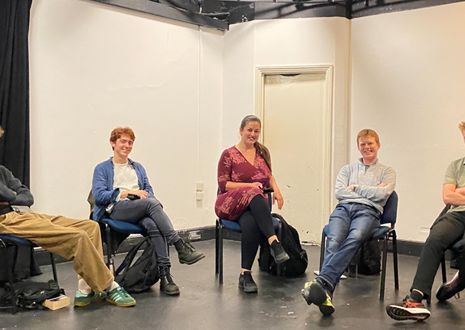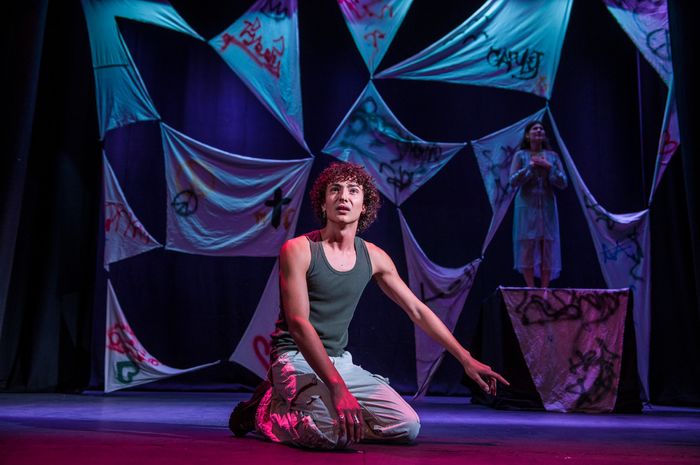Blank Canvas reveals new writing at the heart of Cambridge theatre
Bex Goodchild delves into the importance of reading aloud and testing an audience with the Fletcher Players’ latest lineup of new writers.

The Cambridge theatre scene is known to be one of the greatest facilitators of new students’ writing – a notable example being the musical Six which took Cambridge students of the time, Toby Marlow and Lucy Moss, to professional industry. But before Broadway, before the West End, before Fringe, it had to start somewhere. The new writing that is produced in Cambridge is wildly impressive – but without a starting point it couldn’t exist. New writing demands an audience, and that is exactly what the Fletcher Players are attempting to achieve with their show Blank Canvas.
Ranging from Mages and Merlin, to interwar London, to Diva worship, the lineup showcases a diverse range of new student writing. Consisting of 10 table readings followed by a period of audience feedback, the show aims to create a safe environment that pushes new writing from page to stage – a crucial step which is often one of the hardest to achieve. Speaking with some of the minds behind Blank Canvas revealed to me how vital this opportunity is for up-and-coming student writing in Cambridge.
“Blank Canvas provides a space for this experimentation, and the rare opportunity to hear from the audience directly”
Each writer had different aims for Blank Canvas. Theo Chen’s “302” follows the story of four self-declared gay boys during their military service in Singapore. For Theo, the chance to be involved in Blank Canvas is the chance to test 302 on a new audience. Is the play dependent on the knowledge and culture of the area where it was set or can a Cambridge audience connect with it too? Blank Canvas provides a space for this experimentation, and the rare opportunity to hear from the audience directly. Experimenting with the audience in a similar way to Theo, Irisa Kwok is debuting a piece of prose poetry called “The Lover’s Choice”; she tells me about the distinct position between a draft and a performance, and the importance of the first table read. Before opportunities like Blank Canvas, Irisa would hold a reading at home and have to squeeze into a single room. Using the Corpus Playrooms gives new writing its deserved platform; and I would argue there is a lot more space!
“The point is to focus on the writing, not on the performance”
For Bear Stephenson and his play named Mages and Misadventures, having the script read out is vital to progressing towards the final draft. Finding the plot holes, rules and practicalities of the piece is all made easier when heard aloud for the first time. President of the Fletcher Players, Matthew Wadey, and new writing rep, Zach Lonberg, also stress the importance of writers hearing their work read by someone other than themselves. In fact, they ask for the table read to be under-rehearsed, or even read by someone in the audience on the night. The point is to focus on the writing, not on the performance. Pointing out the interesting difference between something being read and something being performed, Matthew emphasised how – by presenting these scripts to an audience without the spectacle of flashing lights, a rotating city set, or a complex dance sequence – we can focus on the stories themselves and identify their strengths and weaknesses.
Jacinta Ngeh, writer of Angelus, understands the importance of this. Both darkly comedic and fantastical, Angelus follows the experience of a RAF veteran who meets his guardian angel. Jacinta hopes to improve upon the balance of comedy, fantasy and naturalism within her script, drawing on the audience’s response as a method of improving. In her words: “there is really no substitute for having the script be read through from start to finish”. And for that, Blank Canvas is a truly helpful tool.
“Every character has a story that needs to be heard, and every creative needs the voice to do that”
Hearing about each writer’s pieces, I am excited by the huge range of stories. Isabella Bottle describes to me her script Skylines, set in interwar London as the city sees massive change and highrise apartments become popular. Catherine Mclean’s Turpitude is a full length play following nine people in a rehabilitation facility as they are forced to cohabit with each other, mirroring the experiences of the lockdowns which inspired it. Evie Chandler’s Untitled (A Trans Magdalene Play) explores what it would mean to be trans at the end of the world, while Yen Min Ting’s Oranges, Cut into Six is a Malaysian lesbian domestic drama, delving into the persecution of LGBTQ+ people and the safety of the home – with a healthy dose of the gothic.
In all, storytellers have the desire to share – as Theo puts it, they have a “yearning and burning to tell”. Every character has a story that needs to be heard, and every creative needs the voice to do that. Blank Canvas gives these writers a platform, and I for one am very excited to see what is next – both for these ten talented writers, and new writing in the future.
Blank Canvas will be running at the Corpus Playroom from 3rd - 7th October.
 Features / Should I stay or should I go? Cambridge students and alumni reflect on how their memories stay with them15 December 2025
Features / Should I stay or should I go? Cambridge students and alumni reflect on how their memories stay with them15 December 2025 News / Cambridge study finds students learn better with notes than AI13 December 2025
News / Cambridge study finds students learn better with notes than AI13 December 2025 News / Dons warn PM about Vet School closure16 December 2025
News / Dons warn PM about Vet School closure16 December 2025 News / News In Brief: Michaelmas marriages, monogamous mammals, and messaging manipulation15 December 2025
News / News In Brief: Michaelmas marriages, monogamous mammals, and messaging manipulation15 December 2025 Comment / The magic of an eight-week term15 December 2025
Comment / The magic of an eight-week term15 December 2025









